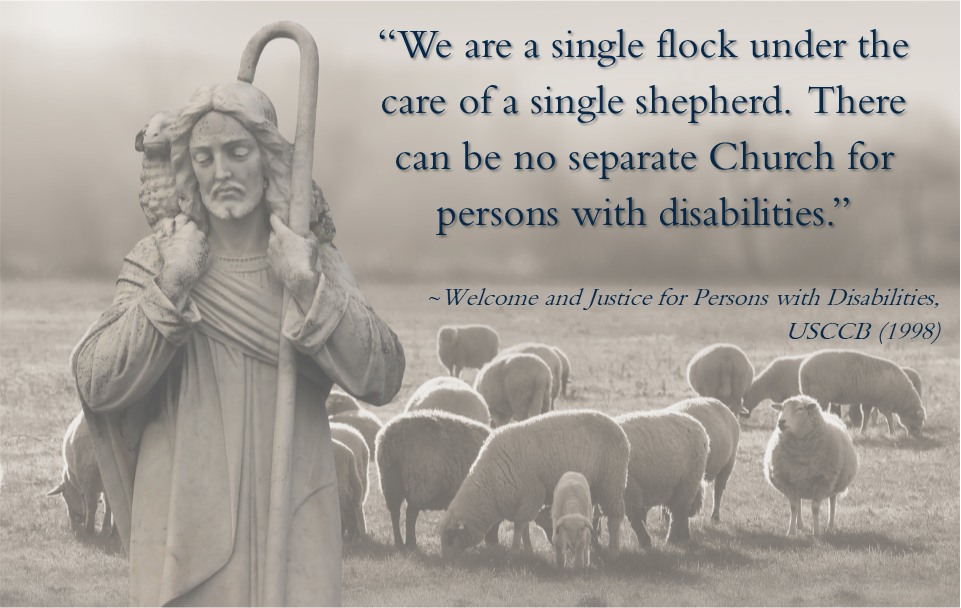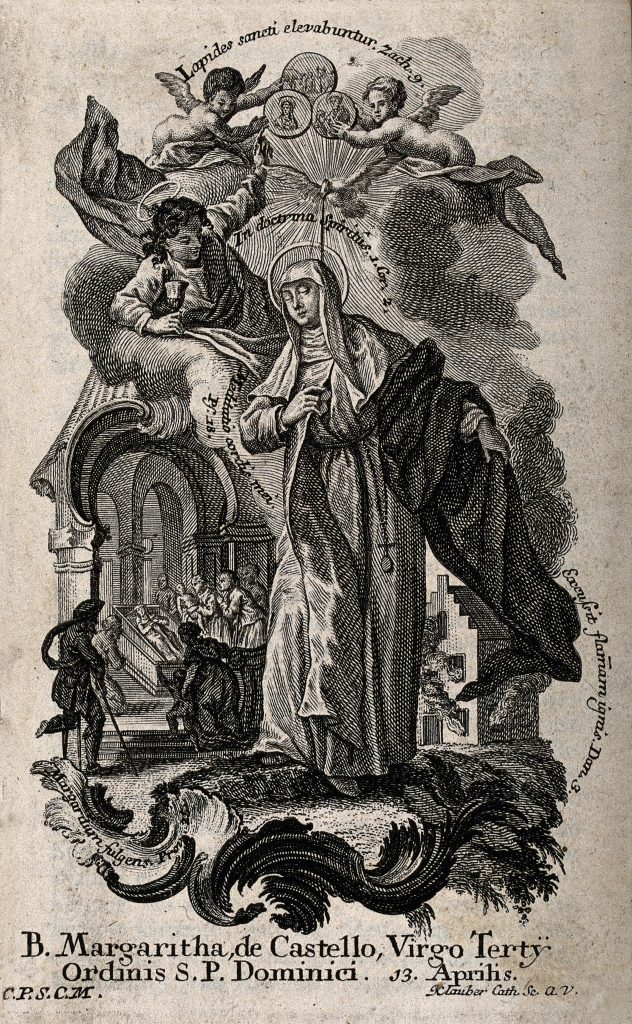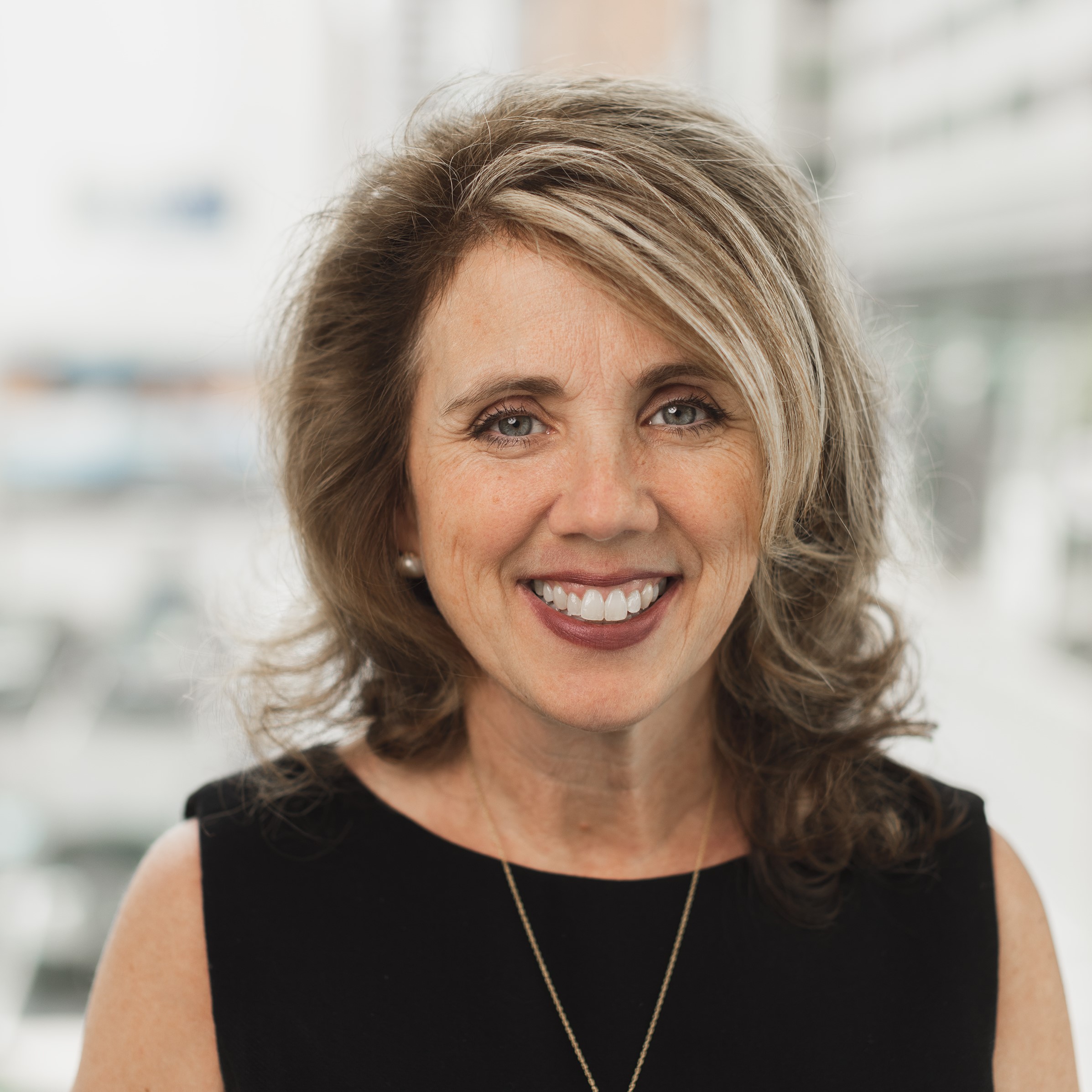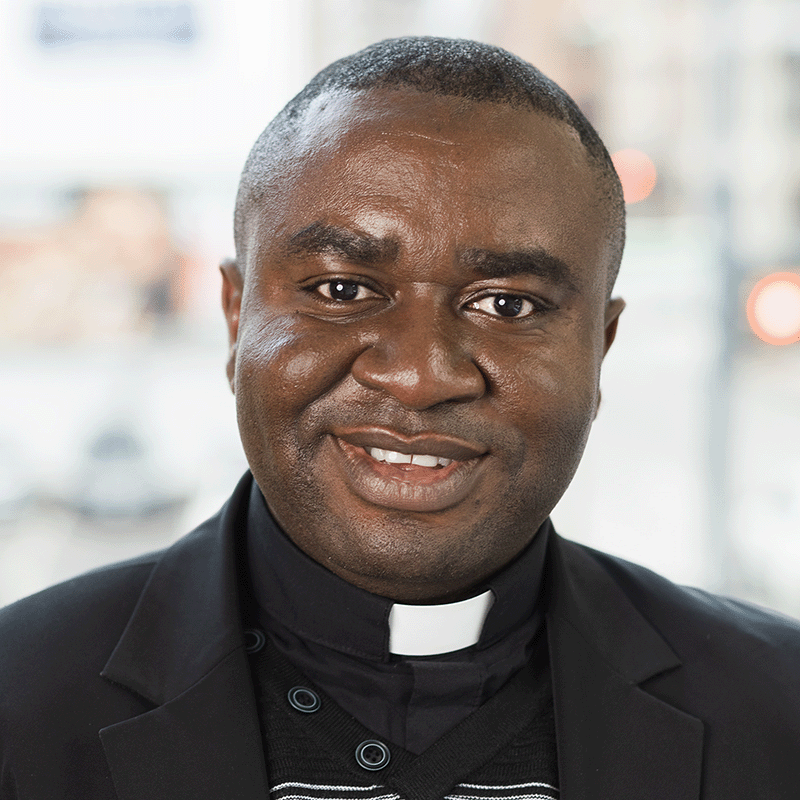
Office for Persons with Disabilities

Mission statement
The Office for Persons with Disabilities serves the Archdiocese of Cincinnati by working to create a culture of inclusion and meaningful participation for persons with disabilities and their families. We organize and provide consistent support, advocacy, and awareness for our parishes while also implementing practices and policies within the Archdiocese to assist parishes in their role of offering the fullness of the faith to all people.
About

The Office for Persons with Disabilities for the Archdiocese of Cincinnati works to focus our efforts around the USCCB’s Pastoral Statment on Persons with Disabilities. This document encourages individuals, families, parishes, and the Church at large to work towards welcoming persons with disabilities into full participation in our ecclesial communities and to advocate for the needs of persons with disabilities in the secular realm. The role of the Archdiocese in these efforts is listed below.
Roles of the Office for Persons with Disabilities
- Practices & Policies: Develop policy and translate it into practical strategies for working with persons with disabilities. Create best practices to follow for ministry with persons with disabilities and recognize those that are already happening in the Archdiocese of Cincinnati.
- Advocacy & Awareness: Serve as advocates for individuals with disabilities seeking help from other agencies. Promote awareness of the needs of persons with disabilities within the Archdiocese of Cincinnati.
- Catechesis, Sacramental Prep, & Participation: Programs of communal and individual prayer, and in celebrations that direct us all towards continued participation in the sacramental life of the Church.
Staff
SUPPORT
Our goal is to provide support for persons with disabilities, caregivers and families in order to create a welcoming and inclusive environment within our Archdiocese and parishes. Each of the below pages contain a plethora of resources, support websites, and media to assist persons with disabilities and connect them with the necessary resources to fully participate in their communities.
For assistance or questions regarding support, please contact the Office for Persons with Disabilities at (937)281-4128 for more information.
To read our most recent news in blog format, click here
If you would like to be added to our email list for monthly updates email Lisa Averion, [email protected]
Today, Catholics across the United States are becoming more aware of ASD which has led to effective teaching styles, accommodations, and education in parishes across the United States. Adults with ASD are writing about their experiences in ministry and Catholic publishers are creating faith formation curriculum that engages different learning needs. Behavior Analysts are working with diocesan directors to help individuals with ASD meaningfully participate across the life-span in Liturgy, and Catholic parents are sharing their input on the needs of individuals more profoundly affected by ASD. CLICK HERE to be taken to our ASD Resource Page.
Today, there are accommodations that help individuals who are blind or who have low vision meaningfully participate in the life of the Church as students, clergy members, pastoral leaders, teachers, and more. Parishes can help to promote the meaningful participation of these individuals by offering parish materials in braille, in large print, and in electronic format. It is important to be aware of the accommodations available for people who are blind or who have low vision so that parishes can benefit from the vocations of more individuals. CLICK HERE to be taken to our Resource Page for Persons with Blindness and Vision Loss.
Deafness & Deaf Culture: Across all age groups, approximately 600,000 people in the United States are Deaf (Gallaudet University). Many people do not consider Deafness to be a disability. Since Deaf people have their own language with distinctive cultural and linguistic features, many Deaf people consider their communicative abilities to be fully thriving. There are a number of dioceses and archdioceses in the United States that have Deaf Apostolates or diocesan offices which engage Deaf culture. These offices coordinate the active participation of Deaf people in weekly liturgies, the sacraments, faith formation, and youth ministry. In our Church today, there are ordained priests and deacons that are Deaf, Deaf Catholic Pilgrimages, and homilies available in American Sign Language online.
While accessibility for the Deaf community is becoming more common within the Church, there is still an urgent need for improvement! The National Catholic Office for the Deaf estimates that 96% of Catholics are unchurched. Even though Deafness is not always considered a disability, the National Catholic Partnership on Disability still engages in the topic of Deafness because the Church desires the meaningful participation of Deaf people. Captioned Videos, Sign language interpreters, Deaf Masses, and Diocesan Deaf Apostolates are all initiatives that can promote this meaningful participation. CLICK HERE to be taken to our Resource Page for the Deaf & Hard-of-Hearing.
Hard-of-Hearing: Some people may consider their auditory difference to be a disability if it prevents them from communicating fully. These individuals may have cochlear implants or may use assistive listening devices. People who lose their hearing later in life because of trauma or old age experience hearing loss which they may or may not consider to be a disability. Captioned videos, American Sign Language interpreters, and assisted listening devices are all examples of accommodations that may help to promote the participation of people who are hard of hearing or have hearing loss. CLICK HERE to be taken to our Resource Page for the Deaf & Hard-of-Hearing.
Developmental disabilities are impairments in physical, learning, language, or behavior that begin during the developmental stage and typically last throughout a person’s lifespan (CDC). An example of a developmental disability is cerebral palsy, which is a motor disability that prevents a person’s ability to move their muscles (CDC). Developmental disabilities include–but are not limited to–intellectual disabilities which limit a person’s adaptive functioning in conceptual, practical, and social domains (APA). Intellectual disabilities include autism spectrum disorder, down syndrome, and fetal alcohol spectrum disorder. It is important for parishes and families to not make assumptions about the capabilities of a person with a developmental or intellectual disability since the capabilities and limitations of each person with these conditions varies widely. CLICK HERE to be taken to our Intellectual & Developmental Disabilities Resource Page.
Recently, our culture has become more attuned to the need for programs and resources that foster mental health. Respecting the mental health of an individual is vital to respecting their full personhood. The Church is blessed to be a source of comfort and hope to many suffering from mental illness. We aim to create environments in our parishes that encourage healing and hope among those with Mental Health issues. CLICK HERE to be taken to our Mental Illness Resource Page.
Good Saint Dymphna, great wonder-worker in every affliction of mind and body, I humbly implore your powerful intercession with Jesus through Mary, the Health of the Sick, in my present need. Saint Dymphna, martyr of purity, patroness of those who suffer with nervous and mental afflictions, beloved child of Jesus and Mary, pray to Them for me and obtain my request. Saint Dymphna, Virgin and Martyr, pray for us.
Since physical disabilities vary greatly in type and severity, finding the right resources and accommodations for a person with a physical disability requires particular individualized attention. Types of physical disabilities include traumatic brain injury, multiple sclerosis, cystic fibrosis, and spina bifida. This page has resources such as support groups, access surveys, and stories which may help to promote the meaningful participation of persons with physical disabilities in the life of the Church. CLICK HERE to be taken to our Physical Disabilities Resource Page.
Some of the wording in this section was written by the National Catholic Partnership on Disabilities: www.ncpd.org.
Frequently Asked Questions
Most frequent questions and answers
Accessible Design is the process of creating or modifying an environment so that is can be welcoming to all people. We are called through our Catholic faith to reach out to all of God’s children and to create an environment that is accessible to people of all abilities. The importance of thoughtful and careful planning for any ministry cannot be overemphasized. Planning should likewise be approached with creativity and openness. CLICK HERE to be taken to our Accessible Design Webpage.
In an effort to embrace and welcome the members of our church with Autism, Down Syndrome, and other sensory-processing issues, the Archdiocese of Cincinnati has begun hosting Sensory-Friendly Liturgies particularly in the Dayton Deanery. These Masses include lower lights, softer music, and shorter more literal homilies. We also use the Children’s Lectionary for more literal readings. The biggest difference is that we encourage families and individuals to get up and move if needed, to bring alternative seating, fidgets or noise cancelling headphones. We try to create an accepting environment and work to eliminate the stigma that many with special needs encounter. Our liturgies have been featured on the EWTN Podcast: CNA Newsroom. CLICK HERE to listen to our interview. CLICK HERE to see a list of upcoming Sensory-Friendly Liturgies.
Our deaf chaplain offers several Masses in ASL across the Archdiocese. To learn more about current events in ASL CLICK HERE and also subscribe to the Deaf Ministry Newsletter.
The NCPD summarizes Cannon Law in this statement:
“Parents or guardians, together with pastors, are to see to it that children who have reached the use of reason are correctly prepared and are nourished by the Eucharist as early as possible. Pastors are to be vigilant lest any children come to the Holy Banquet who have not reached the use of reason or whom they judge are not sufficiently disposed. It is important to note, however, that the criterion for reception of Holy Communion is the same for persons with intellectual and developmental disabilities as for all persons, namely, that the person be able to “distinguish the body of Christ from ordinary food,” even if this recognition is evidenced through manner, gesture, or reverential silence rather than verbally. Pastors are encouraged to consult with parents, those who take the place of parents, diocesan personnel involved with disability issues, psychologists, religious educators, and other experts in making their judgment. If it is determined that a parishioner who is disabled is not ready to receive the sacrament, great care is to be taken in explaining the reasons for this decision. Cases of doubt should be resolved in favor of the right of the Catholic to receive the sacrament. The existence of a disability is not considered in and of itself as disqualifying a person from receiving Holy Communion.”
If you or someone you know is struggling with Sacramental Prep for a child who is non-verbal or developmentally/intellectually disabled, our office has resources to assist your parish in providing these opportunities. Always feel free to reach out and share your struggles. Our goal is to work towards belonging within our parishes and Archdiocese.



